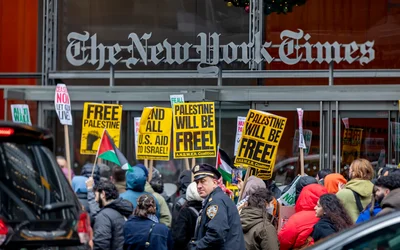More than 150 New York Times contributors have signed a pledge not to write for the US newspaper’s opinion section, citing its “biased coverage” of the Israel-Palestine conflict and war on Gaza.
“Until The New York Times takes accountability for its biased coverage and commits to truthfully and ethically reporting on the US-Israeli war on Gaza, any putative ‘challenge’ to the newsroom or the editorial board in the form of a first-person essay is, in effect, permission to continue this malpractice,” the signatories to the letter wrote.
“Only by withholding our labor can we mount an effective challenge to the hegemonic authority that the Times has long used to launder the US and Israel’s lies,” the writers added.
The letter was signed by dozens of high-profile activists, artists, and US politicians including Rima Hassan; Chelsea Manning; Rashida Tlaib; Sally Rooney; Elia Suleiman; Greta Thunberg; Viet Than Nguyen; and Dave Zirin.
“We owe it to the journalists and writers of Palestine to refuse complicity with the Times, and to demand that the paper account for its failures, such that it can never again manufacture consent for mass slaughter, torture, and displacement,” the authors wrote.
New MEE newsletter: Jerusalem Dispatch
Sign up to get the latest insights and analysis on
Israel-Palestine, alongside Turkey Unpacked and other MEE newsletters
Some other prominent names joining the boycott include Chris Hedges; Marc Lamont Hill; Noura Erakat; Vijay Prashad; Mariame Kaba; Robin DG Kelley; Mohammed el-Kurd; Susan Stryker; Jia Tolentino; Eve L Ewing; Dean Spade; Nyle Fort; Susan Abulhawa; and Rashid Khalidi.
Three demands
The signatories issued three demands to The New York Times.
First, it called on the newspaper to conduct “a review of anti-Palestinian bias and produce new editorial standards for Palestine coverage”.
The signatories called for new sourcing and citation practices, along with a new style guide for how the paper uses vocabulary to describe the Israel-Palestine conflict. The letter also called for a ban on any journalist who has served in the Israeli military.
The writers also called on The New York Times to retract a December 2023 article titled “Screams Without Words,” which alleged that Palestinians who took part in the Hamas-led 7 October 2023 attack committed sexual assault against Israeli women.
That article relied largely on the testimony of an unnamed Israeli special forces paramedic. A spokesperson for the kibbutz where the article claimed the assaults took place later denied the allegations made by The New York Times.
Why the leaked New York Times Gaza memo is just the tip of the iceberg
Anat Schwartz, one of the report’s authors, was later investigated by the paper after it emerged that she had liked a social media post calling for Gaza to be turned into a “slaughterhouse”.
Prior to the article, family members of the girls killed during the attack, who were the alleged victims of the sexual assault, gave several interviews that appeared to contradict the claims made in the story. However, none of these interviews were used in the New York Times piece.
The letter’s signatories also demand that The New York Times’ editorial board call for a US arms embargo on Israel.
The signatories said their demands were neither “impossible nor unreasonable”. The authors noted that the paper updated its style guide during the late 1980s AIDS crisis and also apologised for erroneous reporting following the 2003 US invasion of Iraq.
“There is no US newspaper more influential than The New York Times. Editors and producers in newsrooms across the West take cues from its coverage, it is widely considered the ‘paper of record’ in the United States,” the letter said.
“Since Israel began its genocidal war on Gaza, The New York Times has obfuscated, justified, and outright denied the occupier’s war crimes, thus continuing the paper’s decades-long practice of acting as a bullhorn for the Israeli government and military,” the signatories added.


